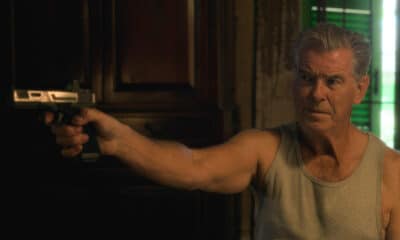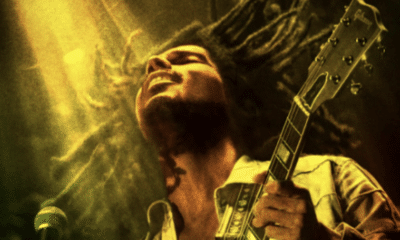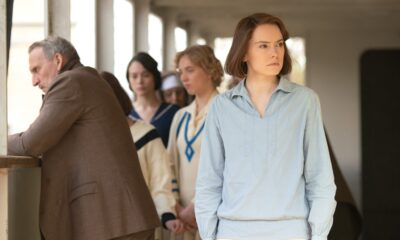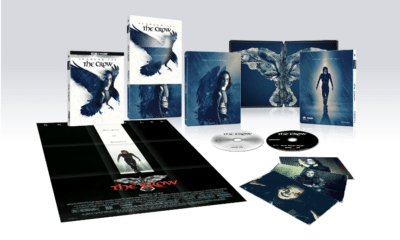
Oscar-winning actor Geoffrey Rush stars as Hans Hubermann in director Brian Percival’s big screen version of the critically acclaimed novel THE BOOK THIEF .
In 1939, 12-year-old Liesel Meminger is sent to stay with foster parents, Hans and Rosa Hubermann, as Nazi Germany gears up for war and nationalist fever and fear grips the country. She arrives with few possessions but among them is a book, The Gravedigger’s Handbook, which she found in the cemetery when her younger brother was buried there.
At first, Liesel is alone, illiterate and afraid but gradually, with the help of her kind, accordion-playing father, she learns to read and grows closer to her family. Her love affair with books – and the power of storytelling – sustains her through the dark days as life in her neighborhood becomes ever more dangerous. She rescues books from book burnings and “borrows” them from the library of the mayor.
The family’s precarious existence is threatened when they secretly shelter a young Jewish man, Max, who is on the run from the Nazis. It’s a brave act of defiance but if Max is discovered the consequences for all of them will be fatal.
Based on the bestselling novel by Markus Zusak, The Book Thief also stars Sophie Nélisse as Liesel, Emily Watson as Rosa Hubermann, Nico Liersch as Liesel’s best friend and neighbor Rudy and Ben Schnetzer as Max. The Book Thief was filmed at Berlin’s world famous Babelsberg Studios and on location in Germany.
Rush was born and raised in Queensland, Australia, and won the Academy Award for Best Actor for his brilliant performance as pianist David Helfgott in SHINE (1997). He has been nominated for an Oscar three other times – for Best Actor in a Supporting role in 1999 for SHAKESPEARE IN LOVE and again in 2011 for THE KING’S SPEECH and for Best Actor in 2001 for QUILLS.
Geoffrey Rush spoke on-set during the filming of THE BOOK THIEF:
Q: How has it been going?
A: Really well. We have quite a bit of the jigsaw down. We have already done some pretty dramatic scenes capturing the life going on in the house and today we’re filming the scene where Liesel first turns up at the Hubermanns’ home on Himmel Street. Emily and I know that a lot of this will be from Liesel’s point of view and she is trying to hear what we are talking about – her brother has just died and it’s a very tough opening to the film. Especially for a 12-year-old actress, who is playing 10 or 11 at this point, since it’s a major protagonist’s story and it starts with death from page one. When she arrives at Himmel Street it’s a bit like a Grimm’s fairy tale in that she feels like she is entering a very dark wood. I said to Emily, “I’m the nice woodcutter and you are the mean stepmother” because that’s kind of the first vibe she gets.
Q: Did you read the book or the script first?
A: Strangely, I’d never heard of the book even though it’s by an Australian writer. So I was sent the screenplay and then read the book. And then one of my daughter’s best friends said, “I read that when I was in year 9 and it changed my life.” She was 14 or 15 at the time. And then I found out that it was not intended to be a young adult style of book, but it really touched that generation. The novel is narrated by Death and it’s very wry, sardonic, haunting, funny kind of language and I can easily see why it appeals to a teenage market. It’s a bit like the Lemony Snicket books, where they mess around with the idea of what a book is supposed to be like and they have a lot of literary deconstructive devices in them. I think Markus has done that beautifully in The Book Thief, which in the film is a little tricky. It is still narrated by Death but they are going for Liesel’s point of view. It’s about how this 12-year-old girl perceives this new family and the shifts that are going on in the small emblematic German community that is reflecting the greater picture of Germany approaching the war years.
Q: The book gives us a different perspective of Germany at that time than we’re used to…
A: Totally. It’s a very big social canvas that it looks at. I keep diving back into the book because it’s great to have all this information about things going on in the character’s heads and so forth. I read recently that 90% of Germany was strongly behind Adolf Hitler and that Hans Hubermann was part of the 10% who weren’t so sure. Also, because of his experience in the First World War and because he is a simple working class man, a housepainter and sign writer, he has this quite beautiful, instinctive, emotional intelligence and he has an empathy for the plight of this girl right from the beginning, knowing that her brother has died, that she is in a strange town, that her mother is a communist; he has put all of that together and knows that the mother is not coming back. Hans and Rosa are like the childless Grimm’s fairy tale couple and this rather extraordinary angel comes into their lives. For Liesel there is no rulebook and she takes life as it happens. She has a bright intelligence and she discovers the meaning of words and how powerful they can be – how powerful they can be in the wrong hands and how glorious they can be in literature and in storytelling.
Q: The character of Max helps her learn more about words while being hidden by the Hubermanns. Why does Hans feel so strongly about taking Max in?
A: It’s something that Hans promised Max’s family and you get much more detail of that in the novel. He made a promise to the family that if at any time he could help them he would. Max’s father had saved Hans’ life during the First World War and he feels indebted to them. And of course they are risking everything by helping Max but there is never any question that they will because Hans is essentially a good man.
Q: How does Hans’ wife, Rosa, react when Max turns up?
A: She stands by him but she is the rather stroppy pragmatist of the piece. For her it’s another mouth to feed and she knows the danger that hiding a Jewish man puts them in. Markus says something really good in the book when he writes that the worst thing that was happening at this time was that people were filled with paranoia, anxiety and fear and that’s why a lot of the townspeople just turn a blind eye to what is going on, because fear is taking them over. And I think Brian captures that in the film very well. Suddenly in the background of a toyshop you see a photograph of Hitler and you realize that it’s even permeating that world of innocence. It’s the propaganda of the cult hero as leader. But most of it you get from our domestic situation.
Q: But in the midst of all this fear there is humour and tenderness in the story? Hans, for instance, plays the accordion…
A: Oh yes. For me, it’s like a monologue when he plays the accordion because he is not a very vocal character except when he needs to rise to the occasion and explain to Liesel how keeping this man in their house must remain absolutely secret, no one can know. He is a very astute paternal figure and he knows what would happen if they are discovered. He says to her, “If anyone finds out you will be taken from me and I can’t begin to tell you what would happen to Max.” It’s very strong stuff. With the accordion he chooses the music to be what he needs to say to Liesel or to the people when they are in the air raid shelter. It’s better than a speech (laughs). It’s such a fascinating instrument.
Q: Can you play it a little?
A: I’m saying I can but there is a little bit of film trickery (laughs). I’m doing everything and there’s no hand doubling or anything like that. I had some suggestions about what Hans should play. In the book, there’s The Blue Danube and I think there’s a Billie Holiday tune but we have gone for things that fit the narrative. I wanted to have something like Die Fledermaus, something really bright and cheery that can be played when the story is at its worst. He is trying to lift the spirits of life going on and the accordion gives the story a little bit of hope.
Q: Having read the book, do you feel the screenplay is a faithful adaption of the book?
A: Yes, it is. Obviously the book is more than 500 pages long and there are many more sidebars and details about what was happening in Germany at that time but Michael Petroni (screenwriter) has distilled the timeline in a brilliant way. He did a fantastic job.
Q: And tell me about Sophie Nélisse. There’s a lot resting on her young shoulders with this role…
A: Sophie is just the best. She has the stillest, most powerful thinking process, seemingly doing very little and conveying so much. And she is still a bouncy 12-year-old kid who is very smart, sharp-witted, cheeky and playful and the camera loves her. I watched Monsieur Lazhar and it’s a very good film. She is the central character in The Book Thief and it will be a very, very strong performance.
Q: And tell me about working with Emily. You’d worked together before on The Life and Death of Peter Sellers…
A: We met in 1996 or 1997 because Breaking the Waves was on the circuit at the same time as Shine so we were all nominated that year – The English Patient, Shine, Breaking The Waves, Secrets and Lies. It was the year when a lot of independent films dominated the awards season so you inevitably meet up at events and awards ceremonies and that sort of stuff. And yes, we worked together on The Life and Death of Peter Sellers – Emily played Anne Sellers, my on screen wife, and we had a very good time. So I was thrilled when I knew that they were casting her in The Book Thief and that she was so passionate to be playing the role. She said, “I never get offered anyone as stroppy and as arrogant as this” (laughs). She is having a great time. And she isn’t playing a stereotype. What is beautiful about the novel and what comes out of the screenplay is that you discover richer and richer inner lives of these people who, at first, from Liesel’s point of view, start out as being strange. There’s a nice technique in that.
Q: And tell me about Brian, the director…
A: He’s from Liverpool so of course he’s a very nice chap (laughs). He’s got a wonderful manner with actors and he likes things to be extremely truthful and sort of down to earth. He is avoiding the cliché that every Nazi is going to be mean spirited, dogmatic and mind controlling. We all know the best takes because he says, “we’ll check that.” I’ve worked on digital films before but in the last three or four years the industry has changed a lot in terms of the rhythm of the set because you don’t wait for three or four days to hear what the dailies are like. You know, it used to be, “has the stuff come back from the lab? How does the scene that we did three days ago look?” Now it’s there immediately. They used to say “print that!” and you don’t hear that anymore.
Q: You’ve been filming at Babelsberg Studios where they’ve built some fantastic sets to recreate the period. How much does that help your job?
A: The sets are wonderful. You walk around Babelsberg and there is so much film history here. One of our streets was used in Inglorious Basterds recently and another film about the Baader Meinhof group. I was given a book about the history of the studios, which I haven’t had the chance to open yet, but I will. Last year they celebrated 100 years of Babelsberg because it started in 1912. It’s funny because people talk about Hollywood and Pinewood in the UK but Babelsberg has a big, fabulous history. And a lot of big international productions come here now because the facilities are so good. I think it’s great that Brian wanted to shoot here in Germany because it’s important for the story and he wanted authenticity. Now that I’m getting older I look more like my paternal grandfather who was of German descent. My great grandmother was German so I’m hoping I pass credibly in terms of looks. And some of the supporting characters are German – we have some great German theatre and film actors. If Brian had made the film elsewhere and he was casting those roles in England or the Czech Republic you may not get the same look. And it’s great for us as actors to be here – the assistant directors are all German, most of the crew are German and you hear the tone of the voice and you feel it’s a little more immersive.
Q: What do you think this piece says about the power of books and the power of storytelling?
A: I think of those dark days, of what was going on in Germany, and in Europe, at that time and the power of language was a vehicle for self-expression, hope and a sense of human identity and not just ideological rhetoric. I think also, in the screenplay, music has a big impact on Liesel’s life. Ultimately, the gift that Max gives her is to say, “you have discovered your humanity and how the world works by reading and now you should go one step further and write.” And I found it deeply moving in the last section of the film where you don’t know who is going to die. Is it Max? This emaciated Jewish refugee hiding in the basement? Could it be Alex Steiner, the neighbor who has already gone off to war? Could it be Liesel who is going to die? Is it Hans?
Q: Have you enjoyed being in Berlin?
A: Very much. I came to the Berlin in 2001 with Quills. I was here for about four days from Melbourne and so I didn’t have time to explore. This time I’ve been to see the Berlin Philharmonic, I’ve been to the Jewish Memorial, I’ve tried to cram a lot in. It’s been wonderful.
The Book Thief is out now on Digital HD and on Blu-ray and DVD on the 7th July from Twentieth Century Fox Home Entertainment. Read our review here.

Latest Posts
-


Film News
/ 23 hours agoPrince Naseem biopic on the way titled ‘Giant’ – Pierce Brosnan to co-star with Amir El-Masry
AGC Studios and BondIt Media Capital are financing the film.
By Paul Heath -


Home Entertainment
/ 24 hours ago‘Bob Marley: One Love’ – confirmed home release details
Available to buy from April 22,2024 or rent on May 6.
By Paul Heath -


Film Trailers
/ 4 days agoNew UK trailer for French drama ‘Rosalie’
The film played in Un Certain Regard at last year's Cannes.
By Paul Heath -


Film Trailers
/ 4 days agoFirst trailer for ‘Young Woman and the Sea’ with Daisy Ridley
Tilda Cobham-Hervey, Stephen Graham, Kim Bodnia, Christopher Eccleston, and Glenn Fleshler also star.
By Paul Heath













